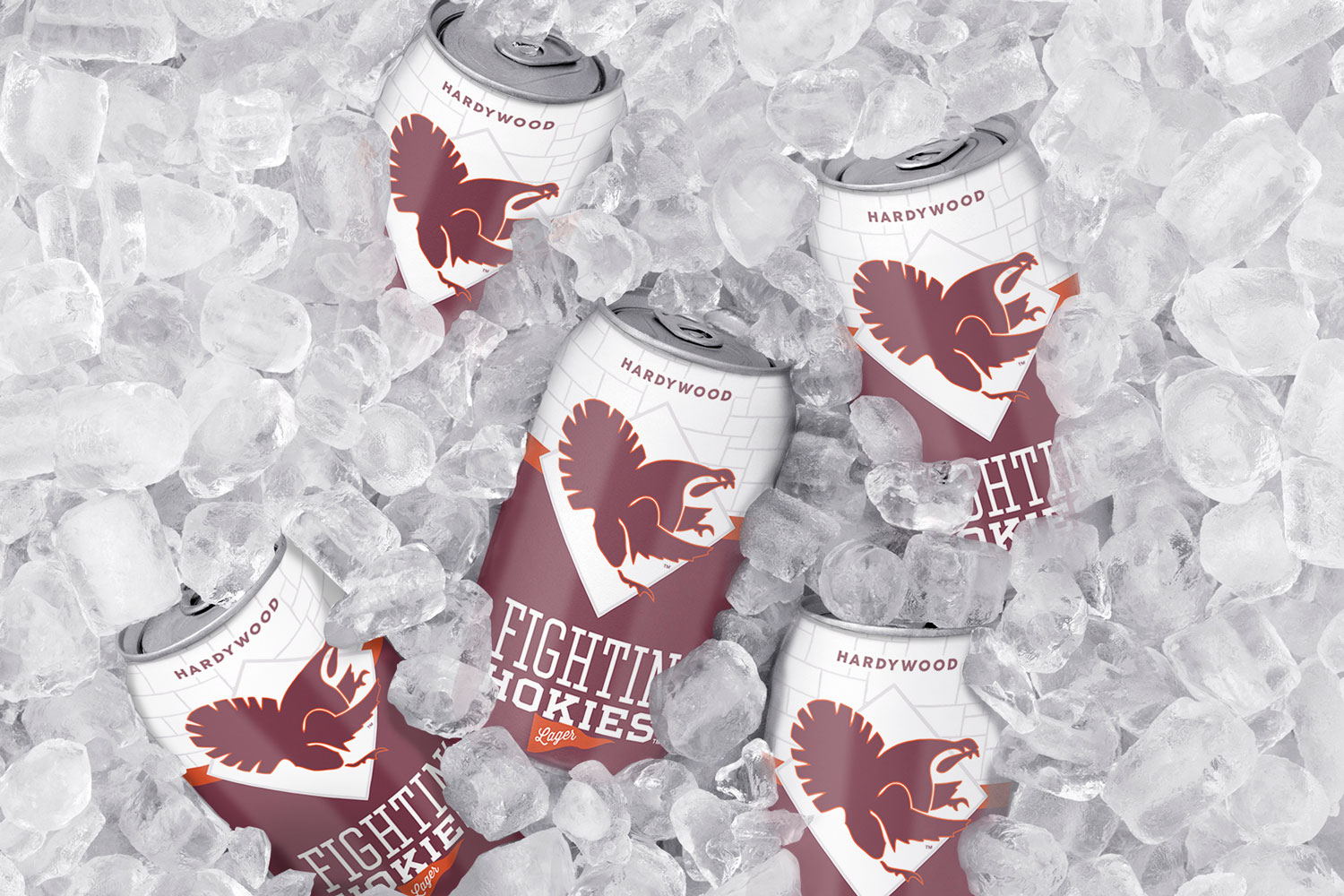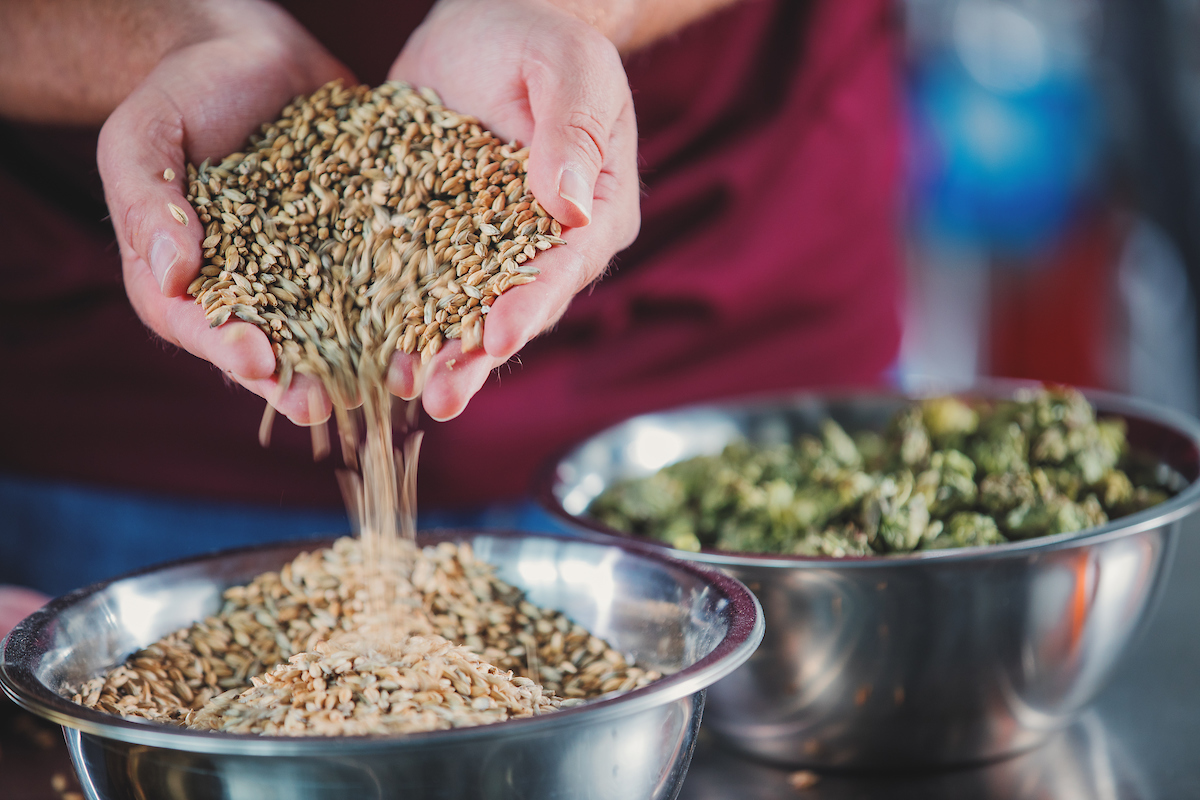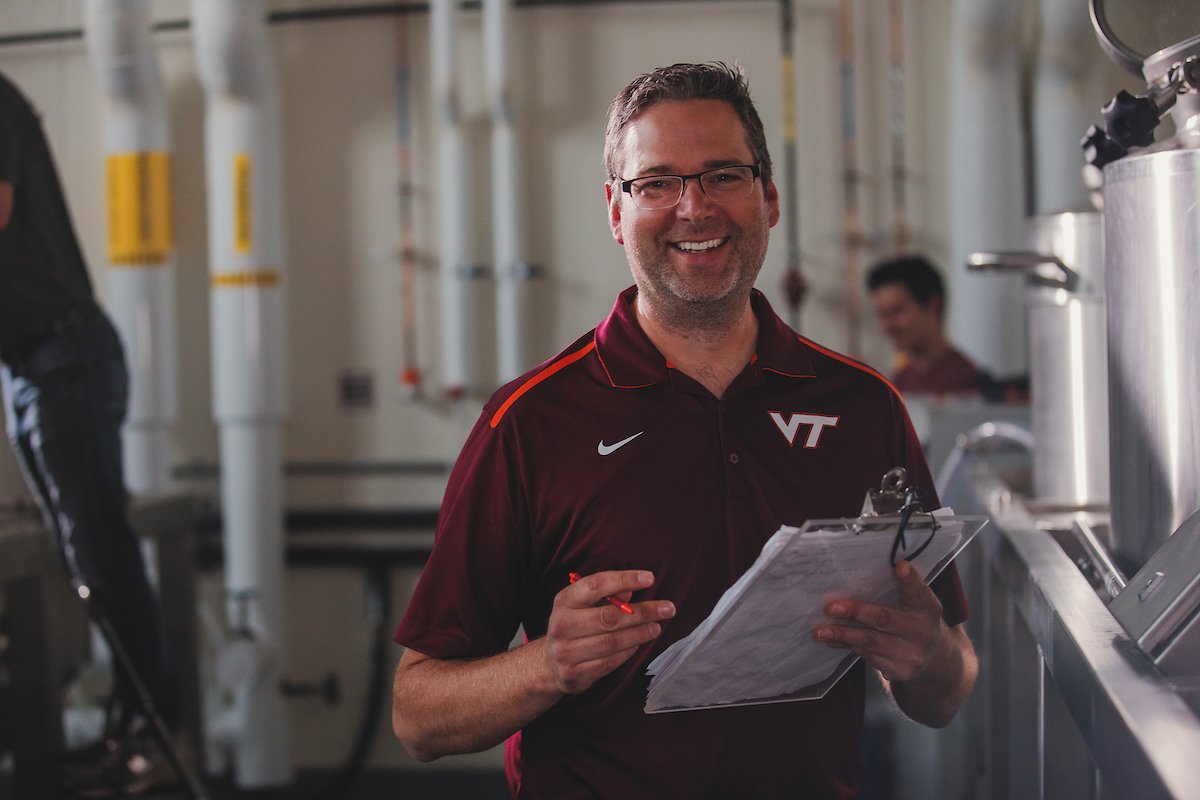Virginia Tech brews up new partnership with Hardywood to produce Hokie beer
“This unique partnership goes beyond a traditional trademark license agreement and supports a campus-wide initiative to take research inventions, and, in this case, a beer recipe, from discovery to market,” said Brandy Salmon, associate vice president for innovation and partnerships.

Virginia Tech’s roots in agricultural research have sparked a new partnership with Hardywood Park Craft Brewery in Richmond, Virginia, resulting in a licensed Virginia Tech beer — Fightin’ Hokies Lager.
This unique collaboration reaffirms Virginia Tech’s land-grant mission to transition world-class faculty-led research and development to market and provide economic benefits to the commonwealth. In this case, the result is a proprietary craft beer recipe developed by Virginia Tech researchers that will be produced and marketed by Hardywood starting next spring.
“We are excited that research developed on Virginia Tech soil will be brought to market with proceeds providing scholarships for our students, enabling the expansion of research programs in our highly regarded food science program and fueling Virginia’s local economy,” said Dan Sui, vice president for research and innovation. “Hardywood is an ideal partner based in Virginia who has values that mirror those of the Hokie nation. We are confident this partnership will brew innovative ideas that excite generations to come.”
Fightin’ Hokies Lager is described as a classic Munich-style Helles lager with balance between pleasant malt sweetness and herbal noble hop character. At 5 percent alcohol by volume, it is clean, crisp, and refreshing.
The bright golden beer will be distributed to better beer retailers, including restaurants, grocery stores, and convenience stores by Hardywood’s network of wholesalers throughout Virginia and Washington, D.C., in the spring of 2021.
A sustainable partnership

Earlier in the year, Virginia Tech started the processes to identify a brewery that had strong brand recognition, a history of quality, a collaborative approach to research and development, a record of sustainability, and the ability to produce a high-quality product to bring to market and meet consumer demand.
As a result, Virginia Tech received interest from several top brewing firms in the country. Hardywood’s reputation for quality beer and commitment to serving the commonwealth through implementing sustainable practices and sourcing ingredients locally made them an ideal partner for Virginia Tech.
“The desire from the beginning was to partner with a premium brewing firm with solid ties within Virginia to produce proprietary recipes that could work hand-in-hand with our faculty to develop and produce the best beer possible,” said Brandy Salmon, associate vice president for innovation and partnerships. “This unique partnership goes beyond a traditional trademark license agreement and supports a campus-wide initiative to take research inventions, and, in this case, a beer recipe, from discovery to market.”
Hardywood’s credo “Brew with Purpose” encompasses core values that include technical quality, environmental stewardship, sourcing local, and giving back to the community.
“As one of America’s leading academic institutions in disciplines vital to the craft brewing industry, from food science to mechanical engineering to hospitality management, Virginia Tech is an ideal, philosophically aligned collaborative partner for Hardywood,” said Eric McKay, president and co-founder of Hardywood. ”The opportunity to help create an official beer of the Hokies is surreal, and certainly a career highlight for Hardywood Vice President of Production and Head Brewer, Brian Nelson, a 2001 graduate of the Virginia Tech College of Engineering.”
McKay said that while the creation of “Fightin’ Hokies Lager” is a meaningful step in the formation of this new partnership, Hardywood is looking forward to future work with Virginia Tech on value adding projects ranging from hosting student internships to exploring the further use of Virginia agricultural products in brewing.
Named Virginia Green Brewery of the Year in 2015, Hardywood was the first brewery in Virginia powered entirely by renewable energy, including solar, biomass, and wind through the Dominion Virginia Green Power Program. The Hardywood team works with local farms to reuse spent grain as compost and feed. Several of their beers are brewed in support of organizations dedicated to environmental awareness and protection.
With roots deep in Virginia soil, Hardywood prides itself on brewing with Virginia-sourced hops, malted barley, wheat, blackberries, raspberries, blueberries, pumpkins, peaches, apples, honey, ginger, locally roasted coffee beans, herbs, and spices.
Foundation of excellence
Virginia Tech’s own brewhouse is just one way that Virginia Tech is helping the commonwealth’s beer industry, which has a more than $8 billion annual economic impact and contributes $2.9 billion in annual total tax contributions, according to the Beer Institute.
The brewhouse and malting system are cornerstones of the Department of Food Science and Technology’s Innovation Collaboratory, a space where industry meets research. Scientists in the department, which is ranked in the top 10 of its kind in the country, have worked with household names, such as Dupont Teijin Films and Tyson Foods, on food safety, packaging, and product development in the pilot plant.
“Our department is big on hands-on learning,” said Brian Wiersema, the plant manager at the Human and Agricultural Biosciences Building 1, where the brewhouse is located. “We had the company pull out some of the automation, yet the system mimics a craft brewing system.”

Housed in the College of Agriculture and Life Sciences, this unique educational program offers numerous experiential opportunities, including a study-abroad program that sends brewing students to Germany to learn about beer-making at Weihenstephan, the oldest continuously operating brewery in the world. Students graduate from the program having real-world experience with a vast knowledge base regarding real-life brewing projects.
Likewise, it’s no surprise that the Department of Food Science and Technology placed ninth on Successful Student’s list of the 10 best bachelor’s in food science and nutrition programs in the country and eighth on its list of best master’s in food science programs.
“Our department has grown dramatically in the last 10 years with new facilities, new faculty, and new options for our degree program,” said Joseph Marcy, who was head of the Department of Food Science and Technology as the vision of the pilot plant and the brewhouse was executed.
“While this growth is an exciting advancement for our department in its own right, it is also a clear expression of our department’s long-standing goal to give each student an excellent experience and a high-quality education,” said Renee Boyer, acting head of the department.
In 2017, the department's fermentation program was one of the first programs in North America to earn recognition from the Master Brewers Association of the Americas (MBAA). The program is among 12 universities in the United States and Canada to meet or exceed guidelines and learning outcomes established by the MBAA in the first year of the formal recognition process.
Faculty-led research transitions to market
The department is home to notable firsts, thanks to the dedication of the faculty like Wiersema; Herbert Bruce, assistant professor of practice for undergraduate education and master brewer; and Sean O’Keefe, professor of food science and technology, who are the researchers behind the Virginia Tech beer.
For the three Virginia faculty members, it all began six years ago with trips and experiences to Munich, Germany, while working on the brewing equipment and the student exchange collaboration. After a hard day's work covering equipment specifications, trials, and student programming, the threesome would find themselves at a local stammtisch with partners from Technical University of Munich. Together, they would enjoy food, camaraderie, and a good Helles lager at authentic German beer houses. Over beer and stories about the day’s events, friendships and bonds were formed.
“A Helles lager is a highly drinkable, clean, and balanced beer that with each sip makes you want to come back for another and is meant to be enjoyed with friends for any occasion,” said Wiersema, who oversees the pilot processing plants for the Department of Food Science and Technology at Virginia Tech, and is responsible for specifying, installing, and operating equipment used in research, education, and Extension.
“We were inspired to bring both the beer style and friendship home to share with fellow Hokies,” Wiersema said.
Once back in the states, the Virginia Tech brewers began to research Helles history, production, and processes reflected in the ingredients and methods for the type of beer. They began to develop the beer recipe, testing batches at Virginia Tech’s brewhouse in Blacksburg, Virginia, using their own 10-gallon pilot brewing system, experimenting with different malts, grist bills, yeast strains, hop varieties, and fermentation processes to arrive at their target recipe, flavor, and aroma profile.
“When we received word that we were going to work with Hardywood, we were thrilled to have them as fully involved partners in this endeavour,” said Bruce. “We knew the Virginia Tech beer was a perfect fit for Hardywood’s German made brewhouse, which has earned major international awards for both Richmond Lager and Hardywood Pils.”
A master brewer, Bruce graduated from the Master Brewers Program at UC Davis, passed the brewer’s exam from the Institute of Brewing and Distilling, London. Bruce has served as head brewer and plant manager of two microbreweries and one brewpub, where he designed and produced dozens of beers for the market.
%20and%20VP%20of%20Production%20Brian%20(r,%20VT%20%2701)%20brewing%20a%20pilot%20batch%20of%20Fightin%20Hokies%20at%20Hardywood_web.jpg)
During the summer months, with the target recipe determined and partnership with Hardywood solidified, the team began their collaborations with Hardywood Brewmaster Patrick Murtaugh and fellow Hokie, Head Brewer Brian Nelson. They began to produce more test batches of the classic Munich-style Helles Lager at Hardywood, refining flavor and aroma profiles in preparation to scale up to commercial production on Hardywood’s custom fabricated 60-barrel BrauKon brewhouse.
“Collaborating with Hardywood's vast brewing knowledge and understanding of scale-up requirements has been fun and rewarding,” said O’Keefe, who began his brewing career almost 40 years ago while studying at the Technical University of Nova Scotia, where he received a master’s in food science degree. “It is exciting to see decades of brewing experience come together and bring this beer to all of our fellow Hokies to enjoy.”
Alan Grant, dean of the College of Agriculture and Life Sciences, said this partnership perfectly encapsulates the research, teaching and Extension missions in which the college is rooted.
“Every day, in every corner of the commonwealth, we are finding ways to help our economies grow by putting research in the hands of people who work so hard to make our local communities thrive,” Grant said. “Just like this new Fightin’ Hokies Lager recipe, this is the perfect combination for our shared successes. Cheers to Hardywood and Hokie Nation!”
— Written by Lindsey Haugh




